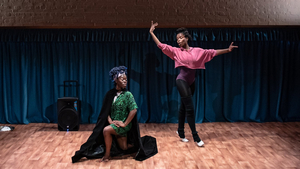Review: DIRTY CRUSTY, The Yard Theatre

![]() It's not been a long time since Clare Barron took both New York and London by storm with her 2018 play Dance Nation, whose portrayal of a group of teenage competitive dancers had gloriously ruptured into feminist fireworks.
It's not been a long time since Clare Barron took both New York and London by storm with her 2018 play Dance Nation, whose portrayal of a group of teenage competitive dancers had gloriously ruptured into feminist fireworks.
Her next work to appear on a London stage is not a new play, but an earlier piece titled Dirty Crusty. Directed by Jay Miller, this hyped-up production at The Yard thrusts itself upon the audience with a near-reckless openness, but consistently proves devoid of anything that could transform its daring, even subversive, spirit into meaningful substance.
Dirty Crusty presents us with a triangle of characters. Jeanine (Akiya Henry) is a 31-year-old woman whose flagrant disregard for her personal hygiene is likely the symptom of a deeper malaise in her life. Victor (Douggie McMeekin) is a sexual partner of hers who makes masks in his spare time, and with whom she grows increasingly involved. And Synda (Abiona Omonua) is a ballet instructor from whom she takes dance lessons.
While much of the play centres on Jeanine, alternating between her awkward sexual episodes with Victor and her semi-therapeutic lessons with Synda, its final portion brings Victor and Synda into a purportedly tender companionship. One might say that Dirty Crusty pretends for a long time to have Jeanine as its main character, but only to reveal its ultimate interest in these secondary figures, who are separately caught in her net.
As with nearly everything about the play, this final change of direction feels unmotivated and incoherent. Though it has only three characters, Dirty Crusty shows a poor sense of how to develop any of them, whether through their actions or words. Much of what we are asked to endure over the course of these intermission-less 100 minutes is a series of bizarre but deeply dull encounters among Jeanine, Victor, and Synda as they attempt to derive more pleasure from, and find some semblance of meaning in, their anhedonic lives.
Sex - as either an act or a subject - appears to be an essential component of these interactions, but it often feels gratuitous, tacked on. The scenes between Jeanine and Victor, in particular, rely on extremely graphic moments - to the extent that the absence of an intimacy director from the creative team listed in the programme is eyebrow-raising.
Miller's directorial orchestration of these wacky elements yields a tonally lopsided hodgepodge: flimsy transitions and redundant shifts to more stylised, musical moments reinforce the sense that the production doesn't really know what to make of the play's undercooked dramaturgy, let alone how to ameliorate it.
Emma Bailey's occasionally insightful set design limits itself to an empty centre stage and two curtained enclosures on the sides (connoting a variety of interior settings), all of which sit uneasily between the literal and the figurative. The belated reveal of Jeanine's messy flat, however, adds some much-needed grounding to this untethered narrative.
Josh Anio Grigg's dreamy sound design similarly undergirds some scenes with surprising control. With its palette of pinks, blues, and yellows, Rajiv Pattani's lighting attempts to foreground the play's abstract hues, but the often-static performances insist on giving us a matter-of-fact rendering of Barron's clunky dialogue and bloated plot.
It seems that Dirty Crusty wants to be a self-consciously naughty, irreverent play. It wants to grapple with our preconceptions of dirt - dirty bodies, dirty sex, even dirty dancing - and show how much of loneliness and self-destruction can be actually bound up with our intimacies with others. But, time after time, it fails to convert these intentions into a resonant, thoughtful whole.
For all its talk of dirt, and a few uplifting scenes of well-played humour, Dirty Crusty does not give you a delicious crust to grasp and savour.
Dirty Crusty at The Yard Theatre until 30 November
Photo credit: Maurizio Martorana
Reader Reviews
Videos

